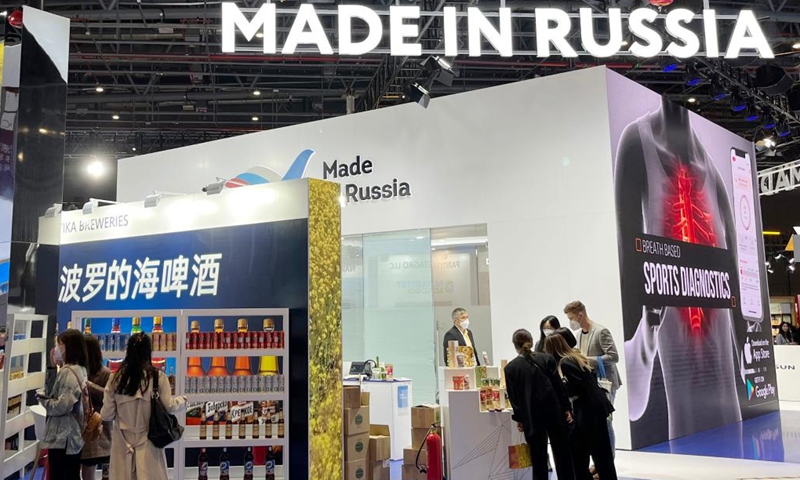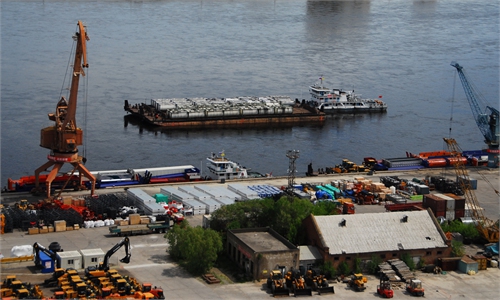Russia online retailer Ozon opens Shenzhen office, a move to ramp up trade, economic cooperation
Bilateral trade relations benefit from complementarity, diversity: expert

This photo taken on Nov. 6, 2022 shows the booth for products of Russia at the fifth China International Import Expo (CIIE) in east China's Shanghai.(Photo: Xinhua)
Ozon, one of Russia's largest online retailers, has opened an office in Shenzhen, South China's Guangdong Province, as the demand for Chinese products keeps soaring, a move that industry insiders envision would spell more business opportunities for Chinese entrepreneurs amid rapidly growing economic ties between the two countries.
From home appliances, laptops and smartphones to clothing and daily necessities, the wide range of Chinese products sold on Ozon fills gaps due to the pull-out of Western companies after the breakout of the Russia-Ukraine crisis. The development will add to their already booming trade in bulk commodities such as energy and agricultural products, observers said.
Bilateral trade will become more complementary and diversified, analysts said, and the trade, which surpassed 1 trillion yuan ($150 billion) during the first 10 months of this year for the first time, is on track to hit the goal of surpassing $200 billion by 2024.
Ozon Global, a division of Ozon, opened an office in Shenzhen as its Chinese headquarters to boost cross-border sales to Russian shoppers on its platform, Simon, managing director of Ozon China, told the Global Times on Tuesday.
Simon said Ozon plans to attract at least 100,000 Chinese sellers to the platform by 2024, and to elevate the gross merchandise volume (GMV) of Chinese vendors 10 times two years later. The company already has more than 10,000 active Chinese sellers.
Chinese products now account for 90 percent of Ozon's cross-border trade. According to Simon, the sales of Chinese products soared in the second and third quarters, rocketing about 25 times compared with the same period last year, and the number of active Chinese sellers rose 18 times, which reaffirms Ozon's decision to expand to Chinese market.
"Ozon opened access for international sellers two years ago, but Chinese sellers only started entering last year. This year, the growth is brisk," Simon said.
The company said there is surging demand for Chinese products in Russia, because China - as a manufacturing powerhouse - "has rich products and appealing price advantages," according to a post on its Weibo account.
"Electronic products such as smartphones, laptops and computer parts, as well as small home appliances and clothing, are most welcome in Russia," Ozon said, while giving a list of Chinese popular brands including Xiaomi, Neatsvor, Huawei and Honor.
Several industry insiders told the Global Times that they are bullish on the business prospects and expect to see their GMVs in Russia growing for at least three consecutive years.
Cai Jun, vice president of international business of Beijing Puppy Vacuum Cleaner Group Co, told the Global Times on Tuesday that the company set up a store on Ozon in the first half of 2022, and home appliances such as vacuum cleaners manufactured by the company have been "quite popular," witnessing 20-30 percent monthly growth in sales.
"Amid the withdrawal of US and European companies due to the broad Western sanctions on Russia, Chinese brands have helped to fill the market gap," Cai said, predicting that more Chinese sellers would join the e-commerce channel to tap into the Russian market's potential.
A manager of a cross-border Chinese trading company told the Global Times on condition of anonymity that the company plans to sell more daily necessities to Russia within the year, ahead of a sales bonanza for the Christmas holidays.
According to the manager, Ozon supports payments in yuan, which is very convenient for Chinese sellers and reduces potential risks associated with exchange rate fluctuations.
Chinese analysts said the setting-up of Ozon's Shenzhen office is a vivid display of closer, win-win economic cooperation between China and Russia, after both sides vowed in October to deepen bilateral relations at all levels, building on their comprehensive strategic partnership in the new era.
"The e-commerce channel is set to create new growth points in bilateral trade, and drive the structure of trade relations toward more balanced, comprehensive, and high-quality development," Song Kui, president of the Contemporary China-Russia Regional Economy Research Institute, told the Global Times. Song added that bilateral trade used to concentrate on bulk commodities, such as energy, mineral and agricultural products.
Simon predicted that bilateral trade will hit a record high this year.
"China has risen to be the most important merchandise source of Russia. The convenience of the e-commerce platform, the variety and affordability of Chinese products, and optimized transnational logistics will continue to propel the fast development of cross-border trade," said Simon.
China-Russia bilateral trade surpassed $150 billion for the first time during the first 10 months of 2022. In yuan terms, trade surpassed 1 trillion yuan for the first time, customs data showed.

